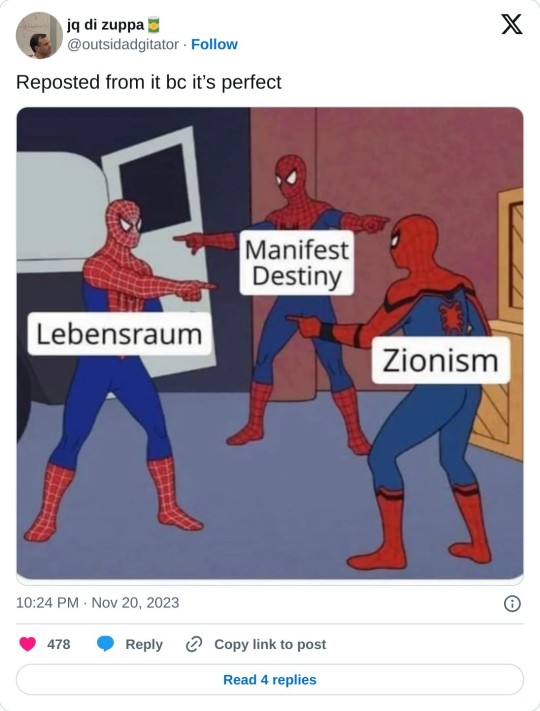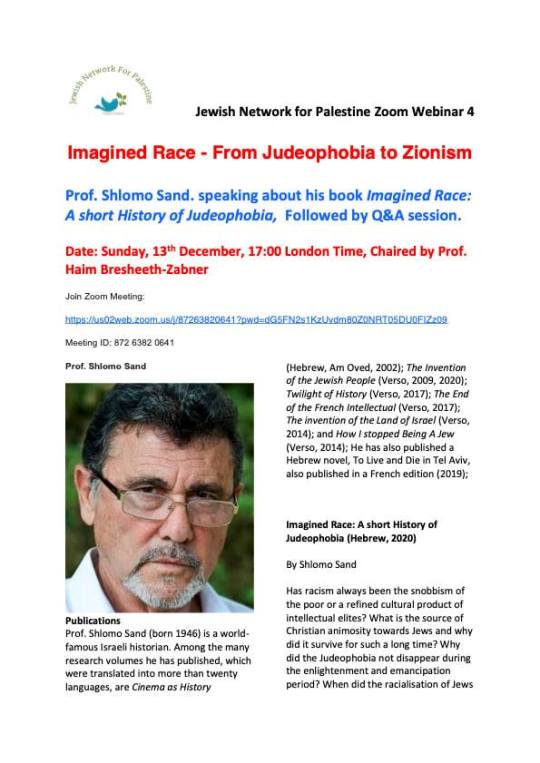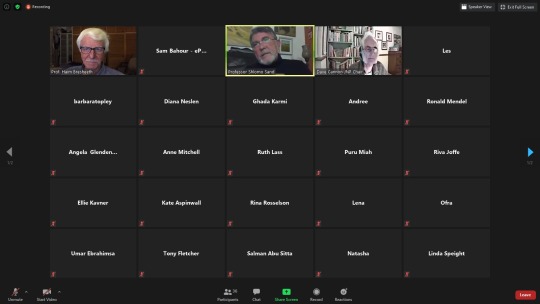#haim Bresheeth-Zabner
Text

Israeli democracy is an oxymoron; it is not even a democracy for its Jewish population, let alone its Palestinian citizenry. Indeed, Israeli sociologists and political geographers have examined Israel in order to find an accurate definition that properly describes its peculiar nature. Oren Yiftachel has called Israel an ethnocracy while Sami Smooha defined it as an ethnic democracy. Other historians looking at similar examples, such as apartheid South Africa, have used a German term of the Nazi period and have defined regimes based on racialized marginalization as herrenvolk democracy, which offers a more nuanced and less atypical definition. After all, Israel and Israeli academics have continuously argued for the exclusivity and exceptionalism of Israel, presenting Israel as unique in world history. Instead, one may examine the normative definition to check their fit for this case.
Haim Bresheeth-Zabner, An Army Like No Other: How the Israel Defense Forces Made a Nation
418 notes
·
View notes
Text
Check it out - Haymarket Books has a free collection of essays about Gaza. Description from the site:
In the final months of 2023, as this ebook is published, Israel is committing a genocide in Gaza. Israeli officials have repeatedly made their intentions to do so extremely clear; talking of collective punishment, mass murder, and ethnic cleansing in newspapers, at press conferences, and on television. All the while, European and American states have continued to support Israel, to claim its murderous campaign is justified self-defense, and to send weapons, troops, war boats, and spy planes. While Western governments have supported the unjustifiable, or spoken inane words of condemnation while failing to take any concrete action, millions around the world have poured into the streets to denounce their complicity, to demand a ceasefire and a free Palestine.
From the River to the Sea collects personal testimonies from within Gaza and the West Bank, along with essays and interviews that collectively provide crucial histories and analyses to help us understand how we got to the nightmarish present. They place Israel’s genocidal campaign within the longer history of settler colonialism in Palestine, and Hamas within the longer histories of Palestinian resistance and the so-called “peace process.” They explore the complex history of Palestine’s relationship to Jordan, Egypt, and the broader Middle East, the eruption of unprecedented anti-Zionist Jewish protest in the US, the alarming escalation in state repression of Palestine solidarity in Britain and Europe, and more. Taken together, the essays comprising this collection provide important grounding for the urgent discussions taking place across the Palestine solidarity movement.
With contributions from: Reda Abu Assi, Asmaa Abu Mezied, Tawfiq Abu Shomer, Khalil Abu Yahia, Dunia Aburahma, Spencer Ackerman, Hil Aked, Yousef Al-Akkad, Jamie Allinson, Hammam Alloh, Riya Al’Sanah, Soheir Asaad, Tareq Baconi, Rana Barakat, Omar Barghouti, Sara Besaiso, Ashley Bohrer, Haim Bresheeth-Zabner, Nihal El Aasar, Mohammed El-Kurd, Sai Englert, Noura Erakat, Samera Esmeir, Rebecca Ruth Gould, Toufic Haddad, Adam Hanieh, Khaled Hroub, Rashid Khalidi, Noah Kulwin, Saree Makdisi, Ghassan Najjar, Samar Saeed, Reema Saleh, Alberto Toscano, and Eyal Weizman, alongside a number of Palestinian writers published pseudonymously.
Published in collaboration with Verso Books
Cover design: Tom Greenwood
22 notes
·
View notes
Link
0 notes
Note
Galina, what can you say about Israel and Palestine?
In the UK there is a pervasive opinion that the situation unfolding in Palestine over the past 75 years is too complicated for the average person to understand. Historically this has obfuscated the matter, keeping the majority of regular people from engaging in meaningful discussion about it for fear of saying the wrong thing out of ignorance. Inevitably this allows people to push their views with the caveat that, if someone disagrees, they simply haven’t taken the time to understand such a complex political situation.
I will not claim to be an expert on this and am still learning. But whilst it is complicated politically, it is not complicated morally. It is my understanding that the Israeli government are a colonial operation using religion as a Trojan horse through which to settle on land which belongs to multiple peoples. This is not about Judaism, it’s about colonial power over land and over the native people. The UK have been politically involved in allowing (or even encouraging) this problem since the start of the 20th century.
I believe it is possible to criticise Israel’s occupation of Palestine whilst simultaneously not allowing this criticism to lean into the antisemitic. I would like to be clear about this. We can also interrogate and dismantle the ways we might perpetuate discrimination against Jewish people whilst supporting the human rights of those in Palestine.
As usual I feel uncomfortable listing things I’ve done as a self-congratulatory public exercise but here are some things to do:
Use the Palestine Campaign’s University Complicity Database to find out how much your university has invested in unethical companies
Write to your university asking them to divest and commit to BDS
Sign the petition requesting that the UK Government impose sanctions on Israel
Write to your local MP to let them know you’ve signed the petition and ask for their support when this is debated in the House of Commons
Write to the Foreign Office asking them to take action in support of the Jerusalemite families at imminent risk of forced eviction from their homes
Encourage your workplace, university or community to interrogate their spending and to support the BDS movement
Be vocal in your support for human rights across the board, with family, friends, colleagues; be interrogative and wary of misinformation online
Check in with your Jewish pals as antisemitism is also rife under the false pretences of being anti-oppression
Texts:
Edward Said, The Question of Palestine
Ra'anan Alexandrowicz, Shilton Ha Chok
Joe Sacco, Palestine and Footnotes in Gaza
Noam Chomsky & Ilan Pappé, On Palestine
Ilan Pappé, Ten Myths About Israel
Haim Bresheeth-Zabner, An Army Like No Other: How the Israel Defense Force Made a Nation (May 2020 – currently free as an e-book, and blog post from the author with up to date commentary)
Audrea Lim, The Case for Sanctions Against Israel
1K notes
·
View notes
Photo


A fascinating conversation with Prof. Shlomo Sand, speaking about his book Imagined Race: A short History of Judeophobia, hosted by the Jewish Network for Palestine (JNP-UK) and chaired by Prof. Haim Bresheeth-Zabner.
I hope the talk gets posted on the JNP page, https://www.facebook.com/JewishNetworkforPalestine
#Palestine #Israel #Jewish #Zionist
3 notes
·
View notes
Text
Well that free book on Palestine from Haymarket Books was a bust, but Verso books is also giving away a free ebook:
An Army Like No Other: How the Israel Defense Force Made a Nation by Haim Bresheeth-Zabner
It says that it is a “history of the IDF that argues that Israel is a nation formed by its army.” It’s written by an antizionist Israeli Jewish man who’s family were Holocaust survivors
I’m currently reading it, but I’m just beginning my leftist education so I might miss its flaws, so if someone who already knows could lmk how this is as a resourc, I’d appreciate it.
Full summary below the link.
The Israeli army, officially named the Israel Defence Forces (IDF), was established in 1948 by David Ben-Gurion, Israel’s first prime minister, who believed that “the whole nation is the army.” In his mind, the IDF was to be an army like no other. It was the instrument that might transform a diverse population into a new people. Since the foundation of Israel, therefore, the IDF has been the largest, richest and most influential institution in Israel’s Jewish society and is the nursery of its social, economic and political ruling class.
In this fascinating history, Bresheeth-Zabner charts the evolution of the IDF from the Nakba to wars in Egypt, Lebanon, Iraq and the continued assaults upon Gaza, and shows that the state of Israel has been formed out of its wars. He also gives an account of his own experiences as a young conscript during the 1967 war. He argues that the army is embedded in all aspects of daily life and identity. And that we should not merely see it as a fighting force enjoying an international reputation, but as the central ideological, political and financial institution of Israeli society. As a consequence, we have to reconsider our assumptions on what any kind of peace might look like.
0 notes
Quote
One should never assume US support for Israel is charitable. The United States depends on Israel as its main power base in the eastern Mediterranean: it is safer than Egypt, more secure than Saudi Arabia, and closer to Europe and Russia. It is difficult to separate US and Israeli foreign and military policies—one is the continuation of the other. Though often Israel does not deliver (the United States felt it did not get an appropriate return on its investment during the 2006 Lebanon War, for example), on the whole, US presidents found it impossible to deny Israel the support it craves. A president who refuses to back Israel requires much courage, as Barack Obama found out in 2015, struggling to ratify the Iran Nuclear Agreement with Benjamin Netanyahu arguing against him in the Senate and Congress. The Israel lobby is the strongest and most capable on Capitol Hill, hardly ever failing to deliver, supported as it is by the powerful security industry as well as the Bible-belt preachers and assorted alt-right billionaires. Israel found the levers to push within the US political machine and it excels at using them, exacting a high price for tasks it executes on behalf of the administration.
Haim Bresheeth-Zabner, An Army Like No Other: How the Israel Defense Forces Made a Nation
1K notes
·
View notes
Quote
Both Zionism and antisemitism posit that Jews cannot (and indeed, should not even attempt to) live among non-Jews; both posit that only in a country without goys will Jewish life be safe. Antisemitism is crucially important to Zionism; it generates committed Zionists and operates as a recruiting sergeant, driving Jews toward Palestine. This “benefit” of Judeophobia was grasped by Zionist leaders beginning with Herzl. Without antisemitism, Zionism is a spent historical force; most Jews still abhor the idea of moving to Palestine unless they face a direct threat. Zionists operate fake “antisemitism” campaigns in many countries, whose goal is to target not actual antisemites (many of whom are now Israel’s closest allies) but rather left anti-Zionist activists, most of whom are Jewish. Through these actions, resistance to Zionism had been relabeled new antisemitism and weaponized through the International Holocaust Remembrance Alliance “definition of antisemitism” as anti-Israel speech, convenient for silencing critics of Israeli atrocities and controlling the debate on Palestine.
Haim Bresheeth-Zabner, An Army Like No Other: How the Israel Defense Forces Made a Nation
2K notes
·
View notes
Quote
Israel and specifically, the IDF, do not separate the civilian and military spheres of activity, but instead blend and integrate them. Ben-Gurion has promoted the notion of the nation under arms, opposing a professional army. This became more pronounced over time, as Israel built a war economy as its financial mainstay. The armament and security industries of Israel are world leaders, attracting enormous income from sales and training across the globe. The military–industrial complex is Israel’s largest industrial sector, employing (directly and indirectly) hundreds of thousands of highly skilled scientists, engineers, and researchers. Israel transformed the conflict from a serious difficulty into a lucrative operation; it lives off the conflict and depends on its continuation.
Haim Bresheeth-Zabner, An Army Like No Other: How the Israel Defense Forces Made a Nation
304 notes
·
View notes
Quote
In Arabic the war is called al-Nakba, literally “the catastrophe,” an apt description of what happened to Palestine and its people: the loss of the country, the cities, villages, homes and fields, the deaths of thousands and expulsion of two thirds of all Palestinians. Its closest conceptual parallel, curiously enough, is the Hebrew name given to the destruction of European Jewry, Ha’Shoah (Holocaust). Both names of these events denote a catastrophic event of biblical proportions in the life of the people who have suffered it. While both events are obviously of a very different nature, what makes them closely related is that the group that suffered one event (Shoah)— Jewish refugees and settlers mainly from Europe, before and after the Holocaust—inflicted the other (Nakba). Israeli intellectuals have noted the affinities between both events, most famously the poet Avot Yeshurun, who even used the Hebrew Shoah to denote both events: “The Holocaust of the Jews of Europe and the Holocaust of the Arabs of Erets Yisrael are one Holocaust of the Jewish people. The two gaze directly into one another’s face. It is of this that I speak.”
Haim Bresheeth-Zabner, An Army Like No Other: How the Israel Defense Forces Made a Nation
258 notes
·
View notes
Quote
In Palestine’s old land-ownership system, villagers owned arable land in common (musha’a), sharing the labor of tilling it and the fruits thereof. Change was introduced by land parcellation and registration under the Ottomans in the eighteenth and nineteenth centuries, yet this hardly changed the fellahin’s relationship to the land. While the land may now nominally “belong” to an absentee landlord, the fellahin treated the land as theirs, despite the obligation to pay a tithe. All this changed with the first Zionist colonies in the 1880s.
Haim Bresheeth-Zabner, An Army Like No Other: How the Israel Defense Forces Made a Nation
183 notes
·
View notes
Quote
Jewish Israel will have to give up on its apartheid policies, on every single shred of racialized inequality. Readers may view this as improbable but should remember that most people believed South African apartheid would never be defeated and that the Soviet Union was a permanent feature of modern history. Political change is a complex result of social will and political pressure, and if both exist, this option may indeed find expression. Such a move will have to be initiated by external forces—the international solidarity movement; the Boycott, Divestment, and Sanctions campaign; a large number of UN members; and, finally, the main powers. This is what happened when South African apartheid was brought to an end, but it was a long and messy process, delivering a partial and imperfect solution, due to pressure by the United States and its financial interests. One hopes that such a solution in Palestine may be more equitable and bring about real change in Palestine —something not yet achieved in the new South Africa.
Haim Bresheeth-Zabner, An Army Like No Other: How the Israel Defense Forces Made a Nation
160 notes
·
View notes
Quote
The battle of David vs. Goliath became the foundational myth fixating Israeli society for the next seven decades. From the Zionist perspective, Palestine in its entirety had to be taken and its population expelled to make way for a Jewish State without a hostile minority. Not only had the country to be conquered and controlled, but so had the national and historical narrative. The Zionist narrative of a small helpless state attacked by seven Arab armies, fighting back to conquer most of Palestine, with Palestinians obeying their leaders who told them to run is a clearly functional fiction that covers up malevolent intentions: the ethnic cleansing of Palestine.
Haim Bresheeth-Zabner, An Army Like No Other: How the Israel Defense Forces Made a Nation
148 notes
·
View notes
Quote
The settlers are heavily armed; protected by the IDF and paramilitary Border Guard, they roam all of the West Bank at will, stealing, burning, pillaging, killing, and maiming. As a result, the West Bank has been turned into the Wild West of Israel, where the law only exists to confiscate land, punish the indigenous, and protect criminal acts of various kinds. Every new wave of legislation makes the life of Palestinians even less viable. One need not even mention Gaza— blockaded, starved, destroyed, disconnected, dehydrated Gaza. It lacks drinkable water, medicines, and electricity; its soil has been poisoned, and its population, that once exported vegetables and flowers to Europe, now lives on international handouts and is controlled by Israeli guns, helicopters, gunboats, bombers, and drones.
Haim Bresheeth-Zabner, An Army Like No Other: How the Israel Defense Forces Made a Nation
125 notes
·
View notes
Quote
War is a necessary instrument of the Israeli state, its kernel of identity. War becomes the existential condition of the nation despite occasional lulls. That is also why it is difficult to distinguish between soldiers and civilians in Israel. Shimon Peres, Ben-Gurion’s adept follower, explained: “Nowadays, soldiers and civilians are exchangeable. Today’s soldier would be tomorrow’s civilian and vice versa, just as today’s civilian settlement would be tomorrow stronghold.” This formed the base of the settlement policy since the 1920s and continues to operate on the same foundational assumptions.
Haim Bresheeth-Zabner, An Army Like No Other: How the Israel Defense Forces Made a Nation
126 notes
·
View notes
Quote
The 1947–49 war produced a new terrifying reality for the Palestinians, the severity of which was not fully recognized at the time. The Palestinians lost their homeland, their homes, their livelihood, and their human rights, none of which have been restored in the decades that followed. An indigenous people became refugees in their own land overnight and are still living in camps set up in 1948 and afterward, as Israel continues to empty Palestine. Most Palestinians today live outside Palestine, while around six million still live in it, refugees in their own country, with few or no rights of any kind. More than four million of them live in the West Bank and Gaza, under brutal military occupation with no end in sight. This terrifying fate was set in motion in 1948, being reinforced and intensified since.
Haim Bresheeth-Zabner, An Army Like No Other: How the Israel Defense Forces Made a Nation
121 notes
·
View notes